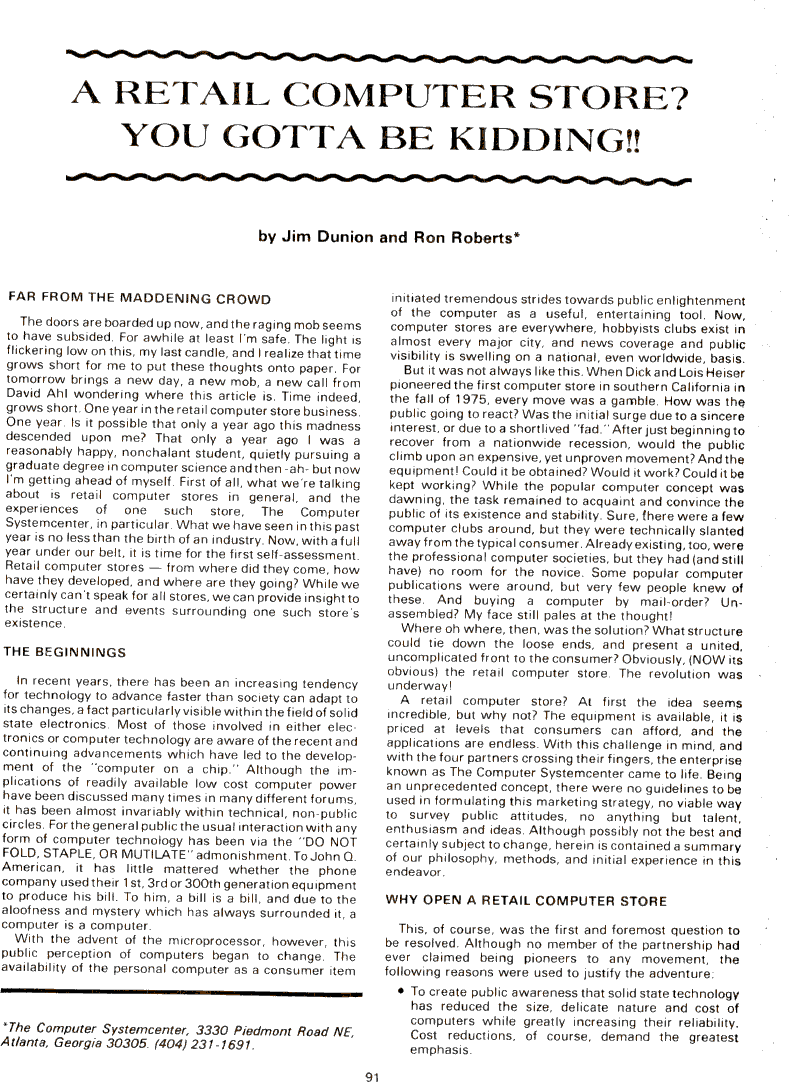by Jim Dunion, Ron Roberts

RETAIL COMPUTER STORE? YOU GOTTA BE KIDDING!! by Jim Dunion and Ron Roberts* FAR FROM THE MADDENING CROWD The doors are boarded up now, and the raging mob seems to have subsided. For awhile at least I'm safe. The light is flickering low on this, my last candle, and I realize that time grows short for me to put these thoughts onto paper. For tomorrow brings a new day, a new mob, a new call from David Ahl wondering where this article is. Time indeed, grows short. One year in the retail computer store business. One year. Is it possible that only a year ago this madness descended upon me? That only a year ago I was a reasonably happy, nonchalant student, quietly pursuing a graduate degree in computer science and then -ah- but now I'm getting ahead of myself. First of all, what we're talking about is retail computer stores in general, and the experiences of one such store, The Computer Systemcenter, in particular. What we have seen in this past year is no less than the birth of an industry. Now, with a full year under our belt, it is time for the first self-assessment. Retail computer stores - from where did they come, how have they developed, and where are they going? While we certainly can't speak for all stores, we can provide insight to the structure and events surrounding one such store's existence. THE BEGINNINGS In recent years, there has been an increasing tendency for technology to advance faster than society can adapt to its changes, a fact particularly visible within the field of solid state electronics. Most of those involved in either electronics or computer technology are aware of the recent and continuing advancements which have led to the development of the "computer on a chip." Although the implications of readily available low cost computer power have been discussed many times in many different forums, it has been almost invariably within technical, non-public circles. For the general public the usual interaction with any form of computer technology has been via the "DO NOT FOLD, STAPLE, OR MUTILATE" admonishment. To John Q. American, it has little mattered whether the phone company used their 1st, 3rd or 300th generation equipment to produce his bill. To him, a bill is a bill, and due to the aloofness and mystery which has always surrounded it, a computer is a computer. With the advent of the microprocessor, however, this public perception of computers began to change. The availability of the personal computer as a consumer item initiated tremendous strides towards public enlightenment of the computer as a useful, entertaining tool. Now, computer stores are everywhere, hobbyists clubs exist in almost every major city, and news coverage and public visibility is swelling on a national, even worldwide, basis. But it was not always like this. When Dick and Lois Heiser pioneered the first computer store in southern California in the fall of 1975, every move was a gamble. How was the public going to react? Was the initial surge due to a sincere interest, or due to a shortlived "fad."After just beginning to recover from a nationwide recession, would the public climb upon an expensive, yet unproven movement? And the equipment! Could it be obtained? Would it work? Could it be kept working? While the popular computer concept was dawning, the task remained to acquaint and convince the public of its existence and stability. Sure, there were a few computer clubs around, but they were technically slanted away from the typical consumer. Already existing, too, were the professional computer societies, but they had (and still have) no room for the novice. Some popular computer publications were around, but very few people knew of these. And buying a computer by mail-order? Unassembled? My face still pales at the thought! Where oh where, then, was the solution? What structure could tie down the loose ends, and present a united, uncomplicated front to the consumer? Obviously,(NOW its obvious) the retail computer store. The revolution was underway! A retail computer store? At first the idea seems incredible, but why not? The equipment is available, it is priced at levels that consumers can afford, and the applications are endless. With this challenge in mind, and with the four partners crossing their fingers, the enterprise known as The Computer Systemcenter came to life. Being an unprecedented concept, there were no guidelines to be used in formulating this marketing strategy, no viable way to survey public interest, no anything but talent, enthusiasm and ideas. Although possibly not the best and certainly subject to change, herein is contained a summary of our philosophy, methods, and initial experience in this endeavor. WHY OPEN A RETAIL COMPUTER STORE This, of course, was the first and foremost question to be resolved. Although no member of the partnership had ever claimed being pioneers to any movement, the following reasons were used to justify the adventure: . To create public awareness that solid state technology has reduced the size, delicate nature and cost of computers while greatly increasing their reliability. Cost reductions, of course, demand the greatest emphasis. *The Computer Systemcenter, 3330 Piedmont Road NE, Atlanta, Georgia 30305. (404) 231- 1691.

